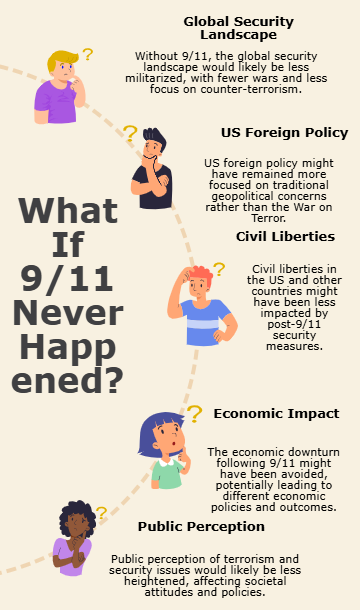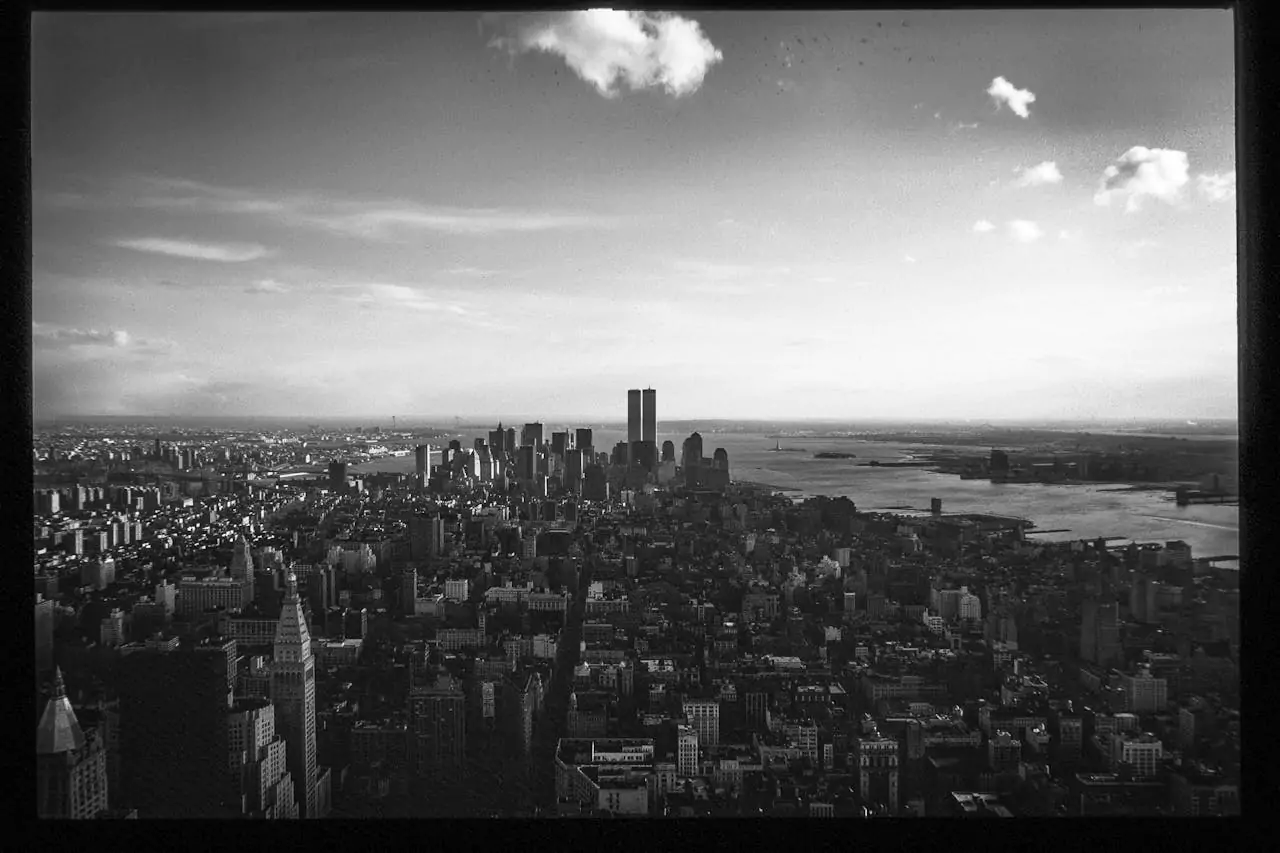Imagine waking up on the morning of September 11, 2001, to a world where the Twin Towers still stood, the Pentagon went about its routine day, and a field in Pennsylvania witnessed nothing out of the ordinary. Nearly 3,000 lives were spared, and the world didn’t pause in collective grief. For most of us, it’s difficult to untangle the threads of our lives from the seismic impact of that day, yet it’s a compelling exercise to imagine how the world might look had history taken a different course.
The attacks on 9/11 weren’t just a tragedy—they were a turning point that altered global politics, reshaped economies, and left deep imprints on culture and society. If those events had never occurred, the ripple effects would be both profound and subtle, touching nearly every aspect of life. Let’s explore how geopolitics, daily life, and even personal freedoms might have evolved in a world untouched by 9/11.
Table of Contents
1. A Less Militarized World and the Absence of the War on Terror
One of the most immediate outcomes of 9/11 was the U.S.-led “War on Terror.” The invasion of Afghanistan began weeks after the attacks, and Iraq followed just two years later, reshaping the Middle East and costing trillions of dollars.
In a world where 9/11 never happened:
- No Invasion of Afghanistan: The Taliban would likely have maintained control in Afghanistan without intervention. Al-Qaeda might have remained an obscure extremist group, unable to catapult to global infamy.
Fact: Post-9/11, U.S. defense spending skyrocketed. The U.S. spent over $21 trillion on the War on Terror, including operations in Iraq and Afghanistan
- No Iraq War: The invasion of Iraq, partly justified by post-9/11 fears, might not have happened. Saddam Hussein could have clung to power for years, leaving Iraq a very different nation today.
What Could Have Been: Without 9/11, it’s possible the U.S. would have focused more on domestic infrastructure, education, or healthcare. To put this in perspective, $21 trillion could have funded universal college tuition for decades.
This alternate reality suggests fewer anti-American insurgencies and perhaps a more stable Middle East. The countless lives lost, displaced, or forever altered by war might have followed vastly different paths.
2. A Different Global Security Landscape
The phrase “airport security” likely conjures images of long TSA lines, luggage scans, and the ritual of removing shoes before boarding. These hallmarks of post-9/11 travel are now part of the collective consciousness.
Fact: Before 9/11, airport security was much more relaxed. In 2000, travelers could pass through metal detectors with little hassle. After 9/11, the establishment of the Transportation Security Administration (TSA) introduced measures like shoe removal, liquid restrictions, and body scanners
Without 9/11:
- Airports Without TSA Lines: Air travel might still resemble the more relaxed, pre-9/11 days when families could accompany loved ones to the gate and belts stayed firmly around passengers’ waists.
- No Patriot Act: The sweeping surveillance powers granted to intelligence agencies post-9/11 might never have materialized. Americans would likely have enjoyed greater privacy, with fewer debates about the trade-offs between security and freedom.
- No PRISM or Global Surveillance Programs: The infrastructure of global surveillance might not have expanded at the same rate, leaving governments with fewer tools to monitor citizens.
Stat: TSA screened nearly 2.5 million passengers daily by 2023. Without 9/11, air travel might remain quicker and less invasive.
It’s easy to imagine this alternate world as more carefree, but the absence of these measures might also have left nations more vulnerable to other threats, whether from extremists or cyberattacks.
3. The Evolution of Terrorism Without 9/11
Terrorism existed long before 9/11, but the attacks reshaped how the world perceived and responded to it.
- Al-Qaeda’s Role Diminished: Without 9/11, Al-Qaeda might have struggled to gain the global attention and notoriety it sought, remaining a marginal player in the landscape of extremist groups.
- No Rise of ISIS: The chaos following the Iraq War gave rise to ISIS. In a world without 9/11, ISIS might never have emerged, sparing the Middle East its brutal campaigns.
- No Global War on Terror: Many nations aligned with the U.S. to combat terrorism post-9/11. Without the attacks, global counter-terrorism might have been a less dominant priority for governments.
Fact: Hate crimes against Muslims surged after 9/11. In the U.S., anti-Muslim incidents rose by 1,617% in 2001, according to FBI statistics
While terrorism likely wouldn’t have disappeared, its evolution might have been slower, and its reach less global. Without the stigma fueled by 9/11, cultural and religious tensions might not have escalated as dramatically, potentially leading to greater intercultural understanding.
4. A Changed U.S. Economy
The financial impact of 9/11 cannot be overstated. Wars, security programs, and infrastructure upgrades cost the U.S. trillions of dollars, diverting resources away from other priorities.
Fact: The 9/11 attacks caused nearly $60 billion in physical damages and disrupted the global economy. The U.S. airline industry alone lost $7 billion in 2001
Without the attacks:
- Lower National Debt: The U.S. might have allocated those funds toward infrastructure, education, or healthcare instead of war efforts.
- Stronger Global Markets: The immediate economic shock of 9/11 rattled global markets. Without that disruption, trade and investment might have grown steadily.
- No Homeland Security Industry Boom: Industries tied to surveillance, defense, and private military contracts grew rapidly post-9/11. Resources could have instead fueled advancements in tech, energy, or other emerging sectors.
5. A Different U.S. Presidency and Political Climate
George W. Bush’s presidency was fundamentally shaped by 9/11, as were the campaigns and administrations that followed.
Without the attacks:
- A Different Legacy for Bush: Bush’s presidency might have been defined more by domestic policies, like tax reforms and education, than foreign wars.
- No Barack Obama Presidency?: Public exhaustion with the Iraq War played a major role in Barack Obama’s 2008 campaign. Without 9/11, his rise to the presidency might have looked different—or might not have happened at all.
- Less Partisan Divide: The intense debates around security and freedom fueled political polarization. Without 9/11, U.S. politics might have remained less fraught with these divisions.
9/11 dramatically shifted global geopolitics. NATO invoked Article 5 (collective defense) for the first time, leading to widespread military involvement in Afghanistan. Without 9/11, U.S.-Middle East relations might have been less adversarial. Countries like Iraq might have avoided invasion, sparing an estimated 650,000 deaths or more resulting from the conflict
6. Cultural Shifts That Never Happened
The events of 9/11 left a mark on American identity and global culture. Without it:
- No Surge in Patriotism: The immediate wave of national unity that followed 9/11 might not have emerged, leaving the U.S. with a more muted sense of collective identity.
- No Rise of Islamophobia: Islamophobia surged in the aftermath of 9/11, affecting millions of lives. In an alternate timeline, this prejudice might never have taken hold on the same scale.
- Different Media Landscape: Post-9/11, films and shows like Zero Dark Thirty and Homeland reflected fears of terrorism. A world without 9/11 might have explored other themes, like climate change or technological advances.
You May Like This: What If Everyone Had a Personal Island Instead of a Home?
7. A World More Focused on Other Global Crises
Without the all-encompassing focus on terrorism:
- Climate Change Leadership: Governments might have turned more attention to environmental challenges earlier, potentially mitigating today’s crises.
- Global Health Advancements: Resources could have been directed toward eradicating diseases like malaria or building stronger defenses against pandemics.
- Tackling Global Poverty: The international community might have made greater strides in alleviating poverty and promoting development.
Fact: The wars in Afghanistan and Iraq displaced over 38 million people, creating one of the largest refugee crises in modern history
8. A World Without the Emotional Toll of 9/11
For those who lived through it, 9/11 was not just a geopolitical event—it was deeply personal.
- No Grief for Families: Nearly 3,000 families would not have suffered the unbearable loss of loved ones.
- No Fear of Terrorism: The psychological shadow of 9/11 has shaped a generation, fostering a sense of vulnerability and fear that might have been avoided.
Fact: Approximately 2,977 people were killed in the 9/11 attacks, and tens of thousands more lost their lives in the wars that followed
9. Could 9/11 Have Been Delayed or Replaced?
While imagining a world without 9/11 is compelling, the reality of global terrorism complicates the picture.
- If 9/11 hadn’t happened, could another attack have eventually forced the same reckoning?
- Would tensions between the U.S. and extremist groups have escalated in other ways?
The seeds of conflict might still have borne fruit, even without the tragedy of that day.
Conclusion: A World Forever Changed
A world without 9/11 would undoubtedly look different, but history rarely allows for such clean alternatives. The challenges of terrorism, extremism, and political conflict existed long before that day and would likely have persisted in some form.
Yet imagining this alternate reality isn’t without purpose. It offers a lens through which to evaluate our current world and consider the choices that led us here. Even amid tragedy, humanity’s resilience and capacity for adaptation remain constants—a reminder that no matter the path history takes, there is always the opportunity to rebuild and move forward.

Key Takeaways:
Here are the key takeaways from imagining “What if 9/11 never happened?”:
- Twin Towers Presence: The iconic Twin Towers of the World Trade Center would still dominate the Manhattan skyline, serving as enduring symbols of progress and ambition.
- Uninterrupted Urban Growth: New York City might have experienced continuous architectural and economic development without the significant impact of rebuilding and memorializing efforts.
- Global Security Dynamics: The absence of 9/11 could mean a vastly different global security landscape, potentially less focus on heightened airport and border security.
- Political and Military Impacts: U.S. foreign policy and military engagements in the Middle East might have taken a different trajectory, altering global geopolitics.
- Cultural and Social Unity: The collective trauma and unity brought by 9/11 would be absent, potentially influencing how society responds to crises and builds resilience.
- Technological and Innovation Pathways: Industries such as cybersecurity and surveillance, which grew rapidly post-9/11, might have evolved at a slower pace.
- Tourism Landscape: The Twin Towers might still be a major tourist attraction, potentially rivaling other landmarks like the Statue of Liberty or Empire State Building for global recognition.
- Architectural Innovation: Without the need to rebuild and design One World Trade Center, architectural advancements and investments may have been directed toward other innovative projects across the globe.
- Shifts in Cultural Narratives: Movies, literature, and media often reflect the impact of 9/11. Without it, cultural narratives might focus on different themes, potentially altering the storytelling landscape.
- Immigration Policies: The heightened security and scrutiny following 9/11 significantly impacted immigration laws worldwide. A world without 9/11 might see more open and less restrictive immigration policies.
- Tech Surveillance Evolution: The push for mass surveillance technology post-9/11 drove advancements in facial recognition, biometrics, and data analysis. Without it, tech ethics and personal privacy might be in a different place today.
- Economic Focus: Trillions of dollars were spent on war and rebuilding efforts. In an alternate timeline, these funds might have been redirected to addressing issues like climate change, healthcare, or infrastructure.
- Air Travel Experience: Airports would likely feel more relaxed and less restrictive, potentially fostering a more seamless and enjoyable air travel experience.
- Symbolism of Resilience: The absence of 9/11 would mean a lack of a global narrative surrounding resilience in the face of terrorism, possibly shifting how nations and individuals perceive and prepare for large-scale challenges.




